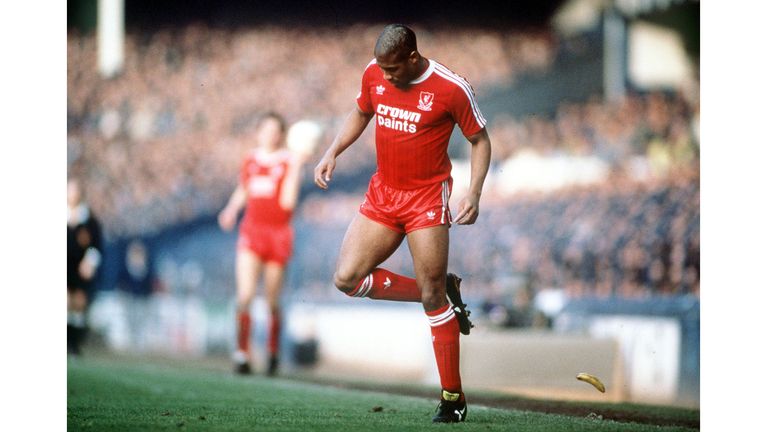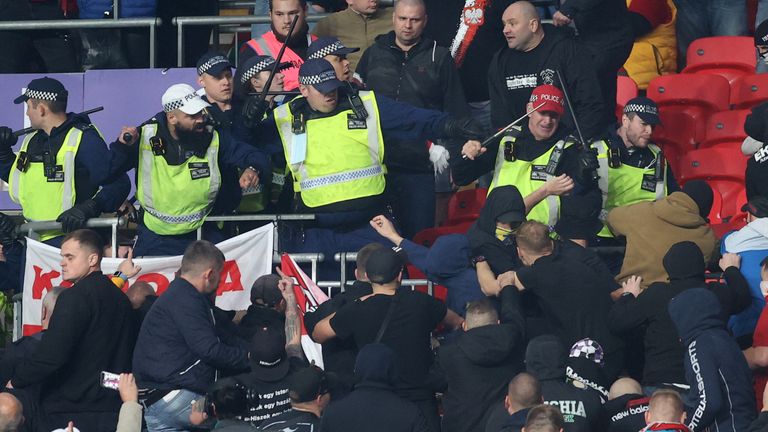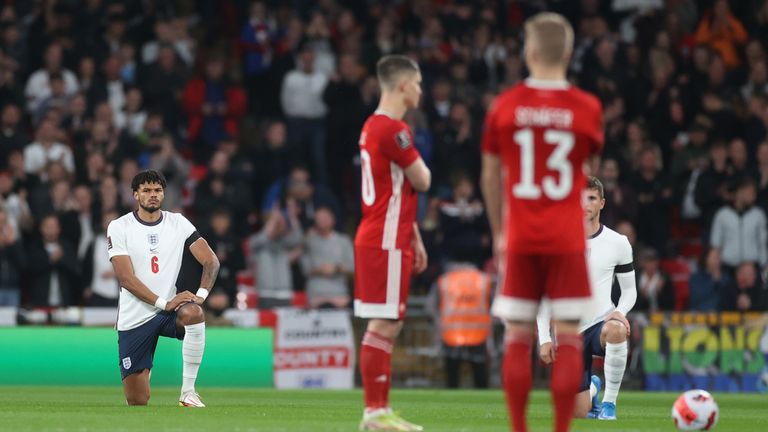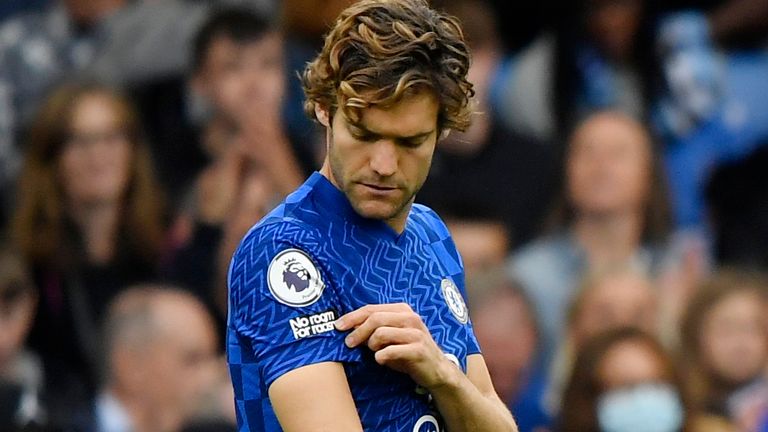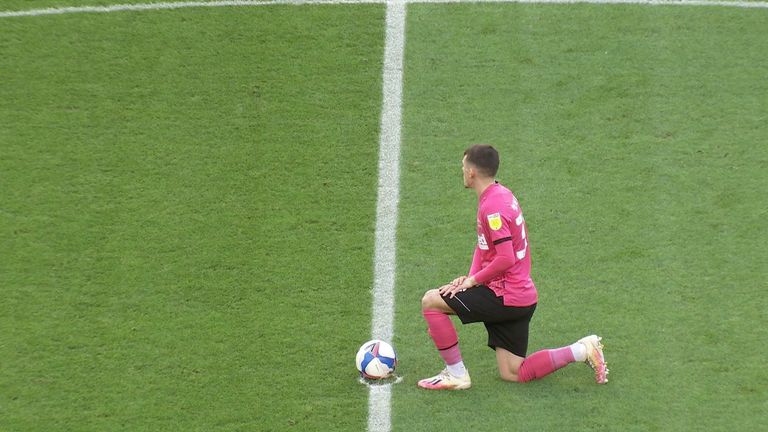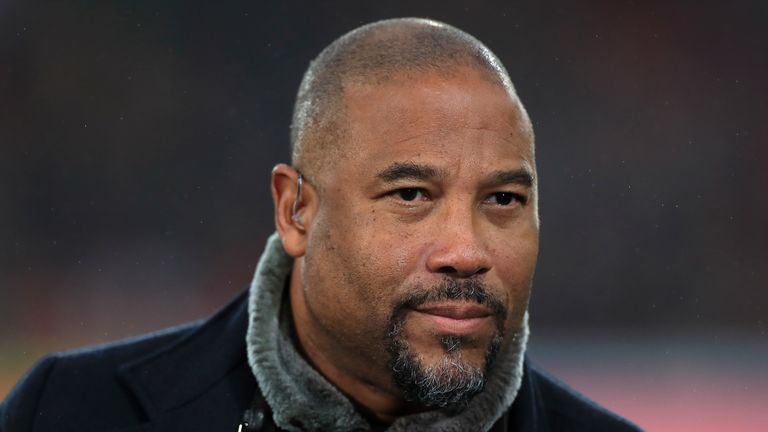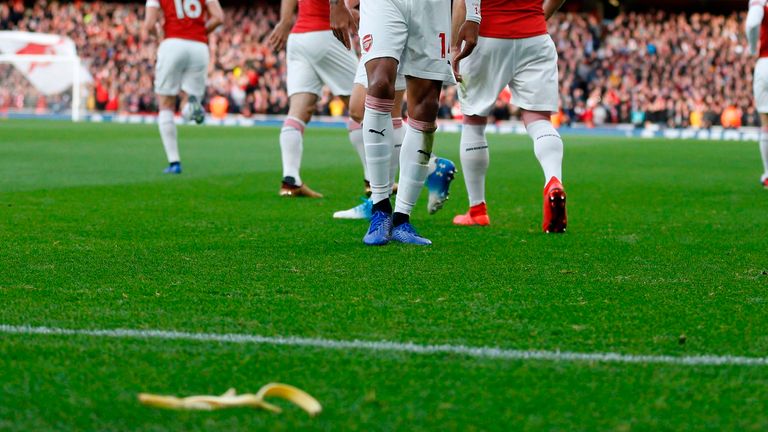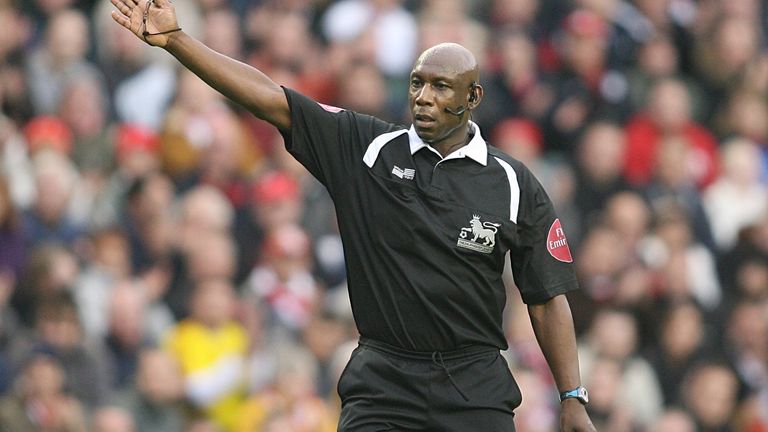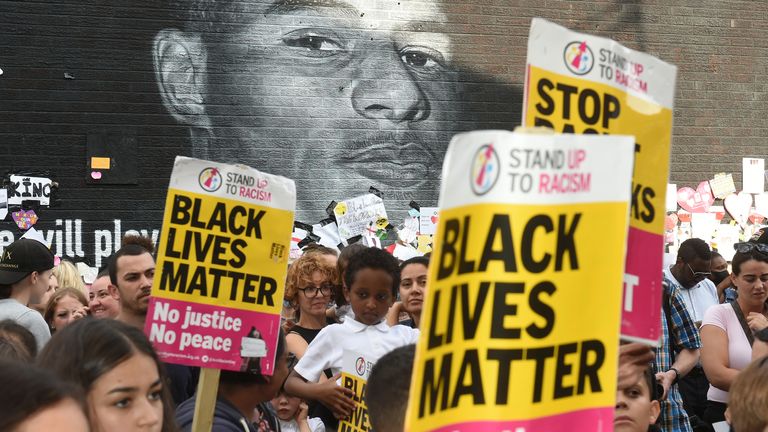Why increasing number of footballers have stopped taking the knee
It’s been a regular sight before Premier League and England matches for more than a year, but footballers taking a knee “isn’t going to change anything”, according to one former Three Lions star.
John Barnes was repeatedly racially abused while playing for Watford and Liverpool in the 1980s – including being pelted with bananas on the pitch – and he believes “football can do nothing to change racism”.
“Until we change the perception of the average black person, we will never combat racism,” he tells Sky News.
“Any discrimination towards any footballer is a very small, minute part of racial discrimination towards black people.
“Is taking the knee going to change someone who’s racially biased?
“They can take the knee as much as they want. Taking the knee isn’t going to change anything.”
England footballers were jeered by Hungary fans as they knelt before Tuesday night’s match at Wembley, which was marred by violence from the away supporters.
Some England supporters booed their own players for taking the knee before the Euro championships earlier this year over apparent opposition to the Black Lives Matter organisation, which has called for the police to be “defunded”.
Gareth Southgate’s players have repeatedly insisted they are not making a political gesture and they are simply reinforcing the message that racism and discrimination will not be tolerated.
But there have been signs in recent weeks that an increasing number of players are questioning the impact of the gesture, which was introduced to the English game in June 2020.
Outside England’s top division, more than a third of Football League clubs are now reported to have stopped kneeling before kick-off.
Meanwhile, Chelsea defender Marcos Alonso is the latest Premier League player to stop taking the knee, saying he believes it is “losing a bit of strength”, and opting instead to point to an anti-racism badge on his sleeve.
He followed in the footsteps of Crystal Palace forward Wilfried Zaha who said the gesture was “degrading”, and Brentford striker Ivan Toney after he argued players were being “used as puppets”.
• So what is the future of the protest and has it achieved its aim in the fight against racism in football?
The boss of Kick It Out, football’s anti-racism organisation, admits he’s been left frustrated at having to talk about the gesture so often and isn’t sure if players will continue with it next season.
“Between now and next August is a long time in football,” Tony Burnett tells Sky News.
“I think it has been a talking point… I think we’ve just missed an opportunity.
“I genuinely don’t think a lot of people who are supportive of players taking the knee are really clear about what the issues are, other than online discrimination.”
He adds: “Part of my frustration on this is I’ve spent a lot of time in the last six months – quite rightly – talking about taking the knee.
“Actually what we need to be talking about is racism – where it comes from, how it manifests in our society, how it impacts our game, and what we need to be doing to tackle it. That discussion hasn’t been had enough.”
Burnett believes some critics of players taking the knee have been “disingenuous” about the reasons for their opposition.
“I think there’s a certain section of our population that would have a problem whatever gesture the players chose,” he says.
“I’m not saying for a second that everybody who is against taking the knee is racist.
“What I am saying is there is a sizeable minority who, whatever gesture those players chose to stand up against racism, would not have been appropriate (for them), because they don’t want to see any activity standing up against things that a lot of us just find abhorrent.
“I think the people who are saying this is politically motivated, I think they are the ones who are disingenuous because I’ve never heard a player say anything about politics when it comes to this.”
• ‘Football can do nothing to change racism. End of story’
Barnes – who has written a new book called The Uncomfortable Truth About Racism – believes the “very basic point” of taking the knee has been lost and compared it to the Me Too movement.
He says: “The Me Too movement was started by a woman called Tarana Burke many years ago about the sexual abuse that young black girls in inner cities were going through.
“Then it was hijacked by a group of women in Hollywood and elite women to then talk about Harvey Weinstein and other people.
“Now people think the Me Too movement is about Hollywood actors or women in the public eye who are being sexually abused and the message is now lost and forgotten about… just like taking the knee is.
“Taking the knee is now talking about Marxism and should they take a knee, and defunding the police – which is not what it’s about.
“It’s just about the very basic point of black lives mattering.”
Barnes believes the debate over taking the knee has distracted from discussing “real change” to tackle racism.
“Football can do nothing to change racism. End of story,” he says.
“The whole idea of things changing because Raheem Sterling scores goals and he’s going to influence people’s thoughts is ridiculous.
“At the moment we still believe that black people, gay people, women, aren’t as worthy as white middle class men.
“Once we get rid of that – that’s not to say we’ll have equality because we won’t, because that’s the environment we live in – but it will be fairer in terms of the discrimination.
“We live in a capitalist environment where the majority have to be discriminated against by the minority – that’s what it is.”
• ‘Some of the institutions within football have got to change’
Burnett says he understands why some players feel taking the knee has “served its purpose” and he wants to see “tangible change” this season to tackle discrimination in football.
He says around 30% of elite footballers are from black backgrounds but the number of black people in coaching, management and other senior roles “is nowhere near enough”.
“Either we say black and Asian coaches aren’t as talented or it’s not a meritocracy and they’re not getting the opportunity to step into those roles. I’m absolutely certain it’s the latter,” Burnett tells Sky News.
“Some of the institutions within football have got to change. Refereeing for example – there is one black referee in the top four divisions of English football.
“We can all remember Uriah Rennie because he was the last prominent black person that refereed and he’s been retired for 15 years.
“There are four black or Asian referees in the top seven leagues in England. That is nowhere near representative of the UK population.
“We’ve got to see some of those numbers move before people really start believing the rhetoric and the platitudes.
“There’s been a lot of platitudes in the last 18 months. I get the fact that actually that for some, the knee has kind of served its purpose – we’ve got to see the action now.”
Meanwhile, Barnes has called for more footballers to follow the example of Marcus Rashford whose campaign for free meals for underprivileged children during the school holidays forced the government into a U-turn.
“He used his platform to talk about people less fortunate than himself,” Barnes says.
“If more elite people were to do that, instead of saying we need more black managers and we need more black people in the boardroom, imagine what could be done to really affect change for kids in the inner cities or women or gay people.”
Source: Read Full Article
